As an amateur scholar and die-hard enthusiast of everything to do with Alice in Wonderland, I have launched a podcast that takes on Alice’s everlasting influence on pop culture. As an author who draws on Lewis Carroll’s iconic masterpiece for my Looking Glass Wars universe, I’m well acquainted with the process of dipping into Wonderland for inspiration.
The journey has brought me into contact with a fantastic community of artists and creators from all walks of life—and this podcast will be the platform where we come together to answer the fascinating question: “What is it about Alice?”
For this episode, it was my great pleasure to have the hilarious and talented Jared Hoffman join me as my guest! Read on to explore our conversation and check out the whole series on your favorite podcasting platform to listen to the full interview.
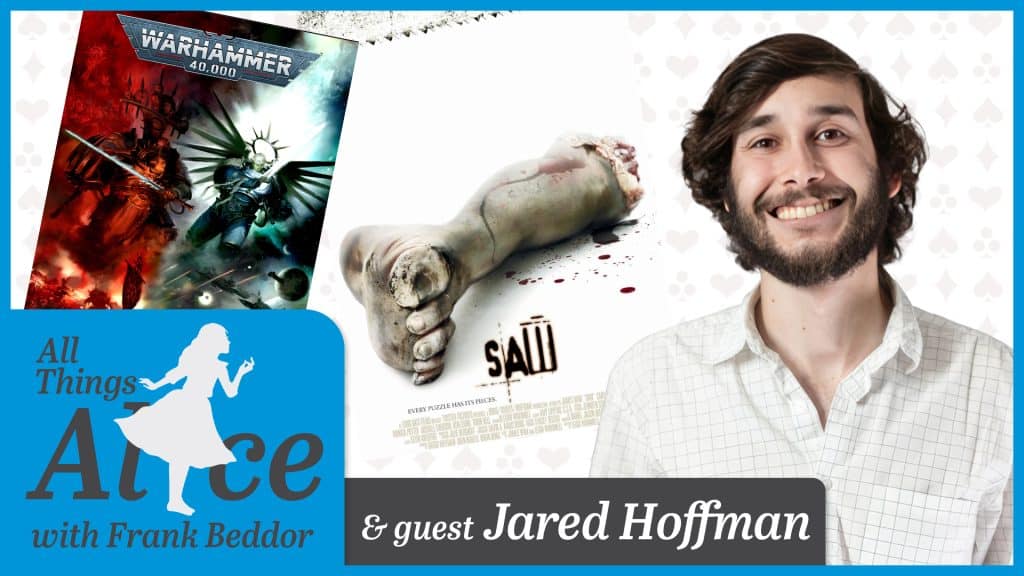
Frank Beddor
Welcome to the show, Jared Hoffman. I’m happy to have you on. I wanted to chat with you about your background and your aspirations. My friend Ed Decter was on the show and he was your professor at AFI. He called and suggested we work together, which has been a fantastic collaboration because you bring a unique sense of humor to the blogs that I don’t have. Whenever somebody has a unique voice, I always like to exploit it for as little money as possible and I feel like I’ve done a really good job with you. But it turns out that I pay you more for blogs than anybody else.
Jared Hoffman
I’m glad you’ve also said that now so that everyone can resent my blogs.
FB
I wanted to go back to your pilot because it was a very funny take on high school, which is a genre I’ve played around in a little bit. Tell me about your experience at the American Film Institute. I’m imagining they said to write something personal or meaningful, something you know a lot about. Is that why you wrote that pilot? Or was there something you were working out that you didn’t work out with your therapist?
JH
I’m always working stuff out with my therapists. That’s an awful process. But in my first year at AFI, the things I wrote weren’t necessarily personal things. Everything I write has some kind of personal flair to it but there was no real connection. And there was no “Why are you writing this?” It was mostly just, “Oh, I liked the idea. It seemed like a fun thing to chase.” But when I was going into year two, I realized that while I had samples that I liked, there was nothing I was really proud of besides a spec script I wrote, which is only useful for writing contests right now. They’re not used at all in the industry anymore. Unless you write a 9/11 Seinfeld episode.
FB
Do you mean that in terms of television or that you can’t sell a spec script?
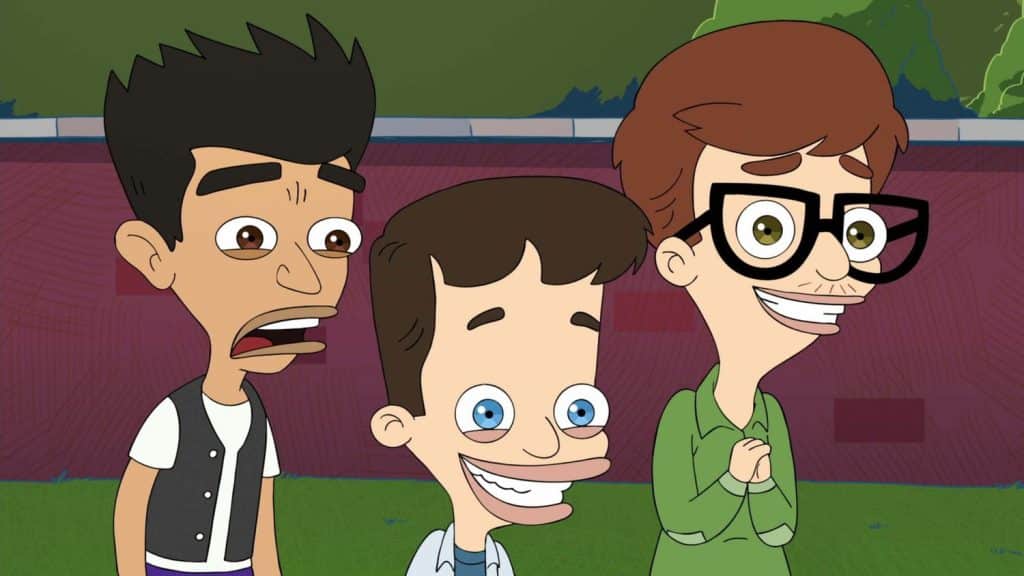
JH
A TV spec. I’ve noticed the term, for some reason, keeps changing but in my first year, we had a TV comedy writing class and a TV drama writing class. I wrote a Big Mouth episode. We were writing an episode of an existing show. That was really the only thing that I was like, “This is good.” It was the only thing that was actually based on any kind of truth about me. Once that clicked for me, it was like, okay, everything has to be incredibly personal for it to be good, at least at this point in my career. So going into my second year, I knew I had to write something personal, specifically for Ed’s group because Ed wanted us to have some ideas coming in.
Ed handpicks his group based on what everyone else has written and because of their personal stories. Ed’s awesome and he’s very aware of what will help you find success in the industry in the sense, especially as a young writer. I could write some crazy fantasy, high-concept thing that has nothing to do with me and it’ll end up in the pile of high-fantasy concept things that a bunch of other new writers have and no one’s gonna take a second glance at it.
FB
Right, right.
JH
Ed wanted a paragraph pitch on what you wanted to write about. Also, I knew Ed before going to AFI. He’s actually the one who convinced me to apply to AFI. I remember in the first class he said, “Just so you know, Jared is friends with my daughter, proceed.” Then John, one of your assistants, pitched an idea about a knight because he has a history background. I think he got to the second sentence before Ed interrupted him and said, “No to all of that.” Then we just went to the next person. I was like, “Oh, cool. You said that we know each other. That’s great. Now everyone hates me.” I think Ed only passed two out of the six ideas to go on to the next steps. It took people weeks to get past even the idea phase to the beat phase of the script.
I always said, “Ed bullied me into writing well.” He didn’t really bully us, but sitting in the beat phase was probably the most frustrating thing ever for everyone in that class. Everyone was just like, “I just want to figure it out on the page.” And Ed was like, “I don’t want that. That’s not how this works.” I came up with an idea based on my therapeutic boarding school when I was 16 and the idea was a kid starts hearing the voice of Christ, but he’s basically at a place where if you were to say that you’d end up in the padded room. So it evolved from back to my original high school. I’m not going to say the name but it was a madhouse. I have really fun stories about that place. It was an all-boys Catholic school and everyone was weirdly really close and very touchy when there were no girls around.
FB
That’s scary territory for me for a couple of reasons. One, I went to an all-boys Catholic school for my freshman year of high school and then St. Margaret’s, an all-girls school, merged with mine. I’m going to go back and just quickly take issue with the notion that Ed was bullying you because that’s what my kids say. I have a senior and a sophomore and they talk about their teachers being bullies at school. I said, “You are being teased. Bullying at school is when you come home bloody or the gym teacher has a paddle with little holes in it or you get hit on the hand by a nun. That’s bullying, not somebody teasing you for making a stupid comment.”
JH
Oh yeah. It was not actually bullying. I remember, after the first class, when almost everyone’s ideas were shut down, most of them weren’t something that was going to stand out. I remember someone said, “You’re gonna be alright because Ed likes you.” I go, “Oh, no, Ed knows me. That just means he has my cell phone number and he’s going to call me and tell me to fix things. I have more classes.” He was a great teacher. I really wanted him. It’s known that Ed is one of the harder teachers at AFI and some people were afraid of that. I dropped out of college, so when I was at AFI, I kind of felt like the dunce. But it was like, “I’m here. I’m paying all this money. This is graduate school. I don’t want the easy teacher.” There were no easy teachers at AFI but I would rather have someone who would force me to be better.

FB
It’s not just being tough on the story and tough on the writing. It’s the preparation for life in the business. I’m curious now that you’re out of school and you’re trying to make your way in terms of selling your projects. The pilot I read that you wrote at AFI was such a great concept. What have you learned from Ed? What was unexpected as you’re going through this as you’re going down this path of trying to get projects, meeting with producers, writing spec scripts, and trying to get jobs?
JH
The most unexpected thing was a vast majority of people who go to AFI don’t outline, and I was one of them. That’s how I can tell if someone is serious about writing. I’ll be like, “I’ve been outlining for the past couple of weeks”. And people are like, “Oh, I don’t do that.” You don’t have to but it’ll be better if you do. So that’s one thing I learned, how important the outlining phase is.
I grew up in the film industry. I always say that I’m nepo-adjacent. My father passed away 17 years ago and my mom was a makeup artist. All of those connections more or less dried up in one way or another. I’ve gotten this far in the career not for lack of trying to use the connections that I gained through my family but, actually, the only success I’ve found has been through connections I fostered myself. Or being lucky enough that Ed is friends with you. The only reason he found out that we lived close to each other at the time was because I was late to class one day and the gate wasn’t working. I sent Ed a picture and he immediately goes, “Is Frank your neighbor?”
FB
That’s funny. I didn’t know that.
JH
Navigating the industry has been really interesting coming from my perspective, especially growing up in it and seeing how it worked as a kid and now trying to figure it out on my own with how much it has changed. There would be times when they would just be like, “Okay, so this is something that isn’t done anymore.” Just trying to figure out what is actually useful. One of the shocking things is how much truth there is to a lot of the jokes about the industry in shows and movies. I had a meeting and I learned that someone doesn’t read. I was just like, “Oh, I thought that was not real. I thought that was a joke.” Right? But, they don’t read. Someone else reads for them and tells them. I was like, “What? How can they make any good decision?” Well, they do. I guess, at this point, they’re in a part of their career where they don’t have to read. Or, something else I realized is you have to write a lot of “Thank You” letters. I’m not the best at writing thank you letters. I’ve always found them to be a little kiss-ass-y.
FB
I haven’t received any myself.
JH
Sorry, Frank, I have yours in the mail. I promise.
FB
In school, I’m assuming there were pitch meetings and learning how to pitch and how has that translated to you? Talk about the ways you’re trying to get out into the world and take meetings. When you do have opportunities, what happens? I know you had a meeting for that game you love so much, Warhammer.
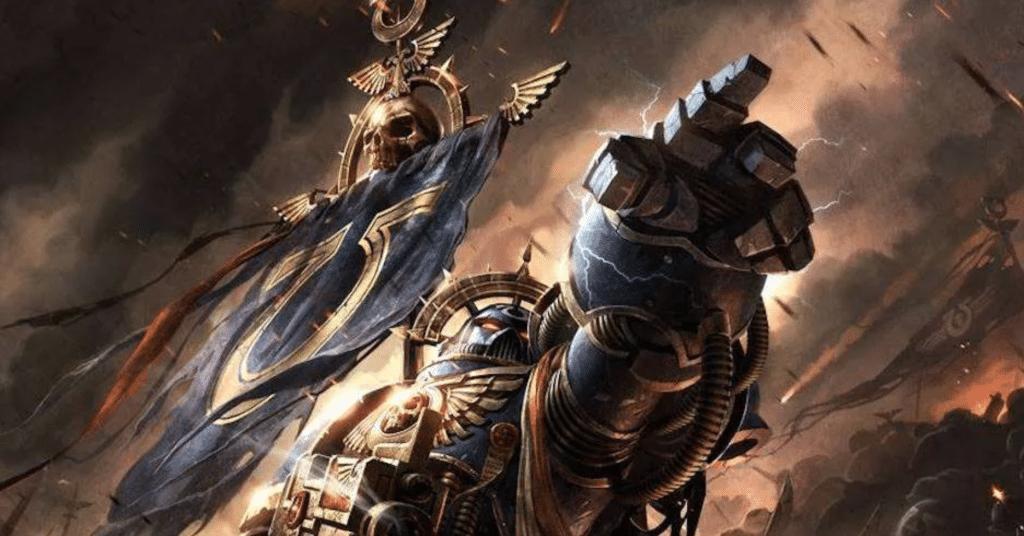
JH
I didn’t have a meeting for that actually. I asked my manager, “Is there any way you could get a meeting for this?” She said, “I’ll look into it.” She emails me back the next day and goes “You don’t have a sample for this.” Warhammer is high fantasy and sci-fi and very serious. All I have are jokes. She said, “I can send your stuff, but I’m gonna look stupid doing that.” I was like, “Yeah, no, that makes sense.” Now I’m trying to push the fact that I’m helping you with The Looking Glass Wars lore.
FB
You’re so into the lore of Warhammer. It’s the idea of “Get me a meeting because I am so deeply seated in that world. I get all of it. I have the books. Let me just tell them all the great things about it. If nothing else, they’re going to feel good about their show coming up.” Yeah, exactly.
JH
Exactly. So my manager and I made a deal. I’m going to write a 10-15 page sample based on that universe. Luckily, there is no shortage of stories in that universe that I can take inspiration from. I’m gonna give that to my manager. I was hired to write a treatment for a producer over the holidays and just finished that a week ago. So now I’m finally able to sit down and write my own stuff again. There are a lot of things I want to get done because right now I only really have one sample that’s being sent around to get meetings. Luckily, it’s the sample you read that won me the AFI contest as well. So I’m going to send that to her to have a little bit more leeway getting in the door. But I believe, with Warhammer, they’re actually making a movie first.
FB
So they’re not putting a room together, which is what you would be ideal for.
JH
Exactly. I believe they’re going to make a show based on how the movie does. It’s Amazon, MGM. Henry Cavill, and then Games Workshop, or maybe Citadel. So I’m just trying to navigate that. I’ve never written something specifically to get a job.
FB
It’s a very good idea. Because it’s hard to know what’s going to work and everybody will say, “That’s never going to work. This is how you have to do it.” But there’s no rhyme or reason to it. If it’s a good piece of writing and it connects and it’s about the subject matter, people will respond to it. I’ve told the story a million times about the World War II feature I wrote. It’s about the skiing and climbing troops who fought during World War II. I wrote a treatment, a short story, and I thought would be The Dirty Dozen on skis. I knew nobody but ended up getting it to Kennedy/Marshall and getting a deal at Paramount. By the way, I sent a letter. Everybody really laughed at me. That’s when there was snail mail.
JH
I feel like with email now, it’s become really easy to ignore emails.
FB
It’s like vinyl. It’s nostalgic to receive a letter.
Where does the writing talent come from? Your mom’s side, your dad’s side, or both of them? Neither?
JH
My dad passed away when I was nine. He only was a dad. I never got to know him as a person. That being said, my mom does say I am a lot like him. I’ve always been someone who likes to tell stories and luckily I’ve had a very interesting 27 years here so far. Or at least interesting enough to get adults’ attention. When I was a kid, I always wanted to talk to adults and have them actually pay attention. I realized the first time someone really paid attention to me was when I said something funny. So, starting from that, I was always trying to crack jokes. I was never a class clown. I talked a lot during class, but I was never the funny kid at school. I was always good at getting essays done. Everyone else would always be like, “I’ve been working on this essay for a while. How are you?” I would say, “I’m gonna write it tonight.” And I’d do well, depending on how good the spelling was which, as you know from reading my work, is not good.
FB
Even with spell check. So I don’t know what you were doing way back then.
JH
Here’s the thing. I’m so bad at spelling that spell check has no idea what I’m getting at. But I would turn in these essays and get passing grades. Then I realized if I spent a little bit more time on it and got better grades, I was going to go to college. I didn’t feel like I was ready yet. So I took a gap year and I lived in Indonesia for a while. I went through a program that set me up with families to live with, but one part of the deal with the program was I had to write articles about what I was doing and stuff like that. I remember reading other people’s articles and I thought, “Oh my god, what?” I just watched a South Park episode last night where they’re in San Francisco and everyone is smelling their own farts because they’re so pretentious and so smug.
But I was reading these articles and thinking, “Who are these Hemingway wannabes with their flowery language? You went for a walk.” So I started teasing these other articles in mine and they got attention. I would tease the reader. I was like, “Why are you reading this?” I wrote one where I said, “This is about cars. If you don’t like cars, don’t read this. I don’t care.” I’m not going to talk about brindled dogs. I still don’t really know what brindle means. That was when I fell in love with writing funny, sarcastic things.
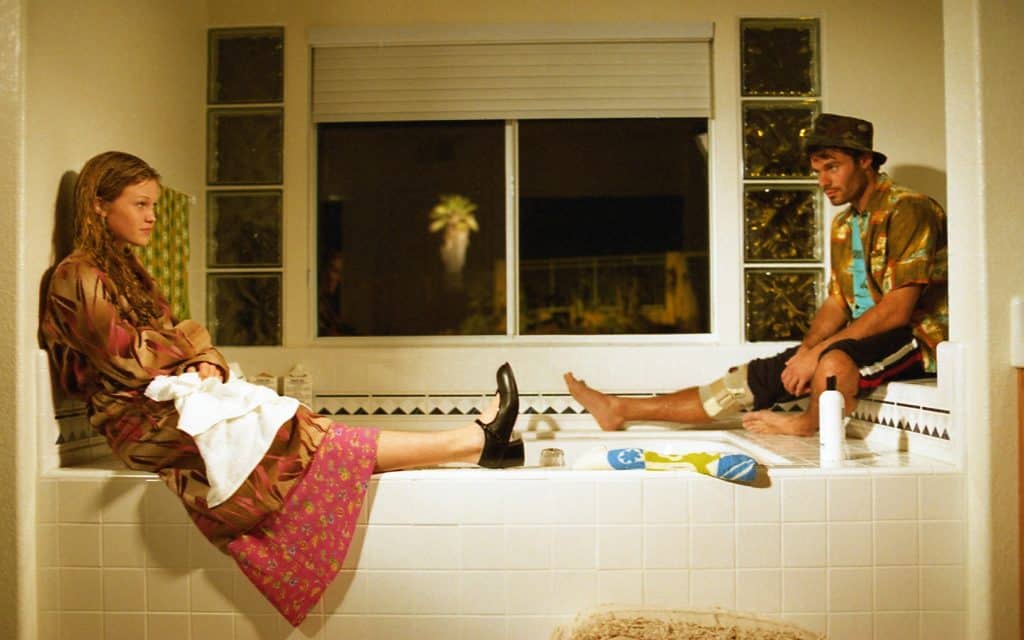
FB
You did an amazing job. You did what you just described in the blog where we played around with the upcoming movie Wicked, the musical supposedly, and my movie, Wicked, that I made years and years ago starring Julia Stiles. One of the things I was asking you to do is do a comparison of the two trailers. But what that morphed into was the idea of having a musical come out, but hiding the fact it’s a musical in the marketing for the film. You did a very, very good job, very sarcastic and funny. I really love that piece, which people can read on the website.
I wanted to go back for a second because I wanted to tell you a little story. You didn’t mention your dad’s movies. I don’t know if you know this story. Years and years ago, these two filmmakers came into my office and they showed me five minutes of a horror movie.
JH
I have a feeling I know where this is going.
FB
I was like, “Wow, this is kind of amazing.” I can’t remember exactly what I was thinking at the time but I definitely knew I wasn’t going to have the money to help them complete it, which is what they were looking for. Years later, I met Oren Koules. who was a producer and was interested in something of mine. We went into his office and he told me he had just produced this movie, and it turns out he produced it with your dad and a guy named Mark Burg. It turned out to be the first Saw movie, which has gone on to be probably the most successful independent film series of movies. Do you have any recollection of your dad making Saw?
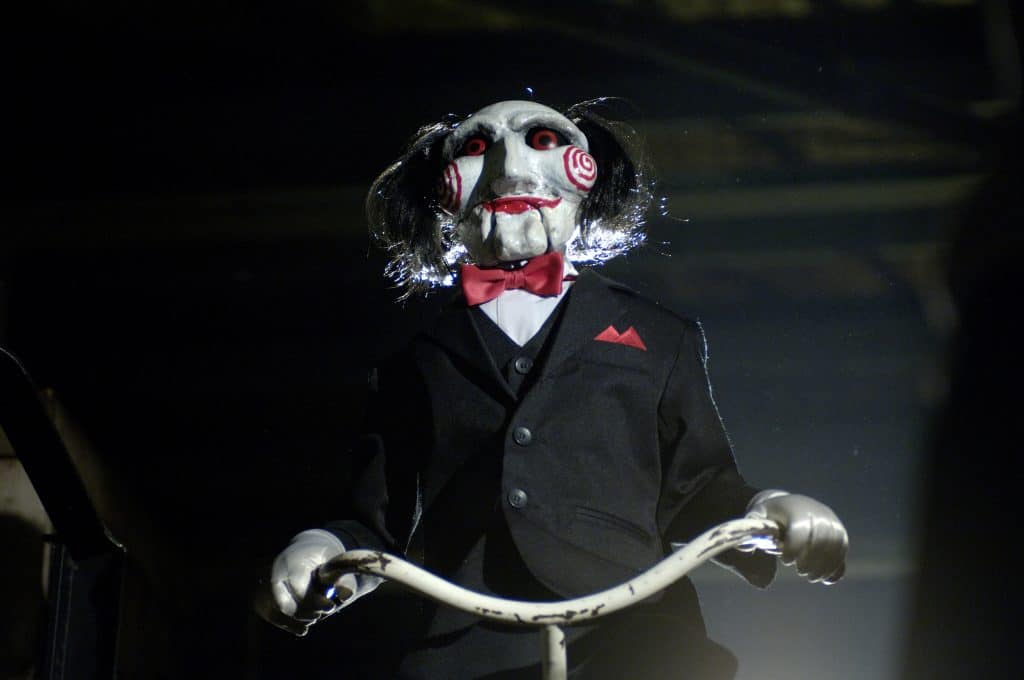
JH
It’s burned into my mind. They shot the first Saw it in two-ish weeks. It’s wild. I believe the total budget was $1.4 million but the shooting budget was actually only $800,000. The extra $600,000 came later for marketing. I remember my dad telling me a little bit about the movie. I was six or seven. I remember going on set. It was shooting somewhere in Burbank on this tiny little soundstage. I just remember the brick. The outside was brick. Before going in there, I remember my dad sat me down in the car and said “I’m shooting a horror movie. There’s gonna be a guy in the bathroom.” The police station was right behind the bathroom and then there was a bedroom. It was all very tiny, shared walls.
FB
Minimal sets constructed to maximize the production values and minimize the cost. Your dad, Oren, and Mark saw more than I did. Boy, do I regret that decision. I should have put my house up and thrown down the cash for that.
JH
I remember my dad saying, “There’s a guy on the floor and you can see his brains and there’s a big pool of blood. Then there’s two guys chained up.” I was there when they were shooting the scene where Cary Elwes cut his foot off. I was sitting behind the monitor watching it. I was so interested. As a kid, that could have been potentially scarring. But the thing is, I was so interested in how they did it and how they made it look like he was doing these things that it didn’t freak me out. I was much more interested in how they were hiding the fact he still had his foot. The only thing that scared me was Billy, the doll. Everything else was not scary to me. And there was a toilet that was filled with gross stuff.
FB
Dolls are always the scariest.
JH
I’m seven. I’m a boy. I thought that was the funniest thing in the world. My dad’s making a comedy. I was on that set a lot growing up. I think James and Leigh were younger than me now when they shot that.
FB
The director, James Wan, that guy has gone on to do some huge movies.
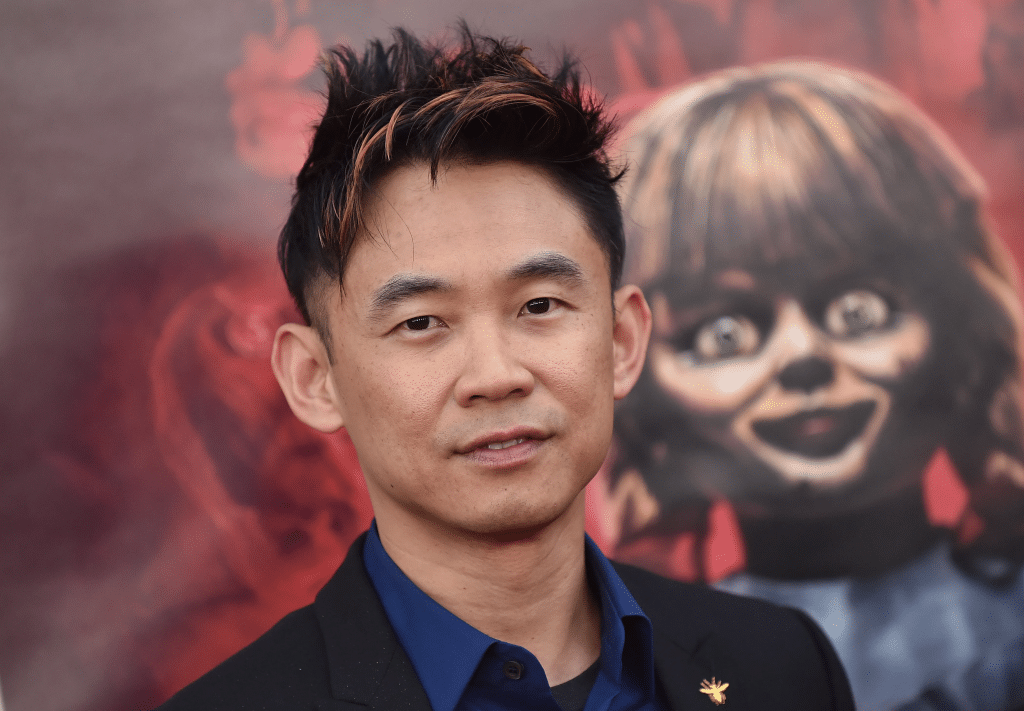
JH
He’s everywhere. James and Leigh wrote it. James directed it and Leigh acted in the first one. I remember my dad having a meeting with James once. James was so young and he came to our place and I was so little. I was like, “Cool, this is a guy to hang out with.” My dad was gonna have a meeting with him and I was like, “No, you’re coming with me.” I dragged his hand and we just hung out.
FB
He seemed like a high school kid when I met him.
JH
He was in his early 20s when he shot that, so yeah, younger than me now.
FB
Exactly. In the short, they had a few scenes which were really great.
JH
The scene in the short was the bear trap scene, which is now very famous. Oren is actually the body that Amanda has to get the key from, which is kind of funny.
Before Saw, my dad worked at Disney and I remember we went to Australia because he was shooting George in the Jungle 2.
FB
That’s a better movie for a six-year-old.
JH
That set was amazing. George’s treehouse was fully functioning and I got to play in it. For a five-year-old at the time, that was fun. There were trained birds. It was a great time. I remember when Saw became what it was because it always felt like a little movie that could. It was shot in two weeks. Then there was a newspaper article and my dad was in the newspaper. This is when being in the newspaper was still a big deal. They misspelled my dad’s name. He had two G’s for Gregg. I remember it just all kind of changed, overnight, it felt like.
FB
It was a sensation. The box office performance was a big surprise. Now, micro-budget horror movies take off all the time but Saw just came out of nowhere. It’s rare that a couple of producers and a manager would throw their own money into it, which was a ballsy move. It’s one of the rare success stories where the original creators still own their own creation.
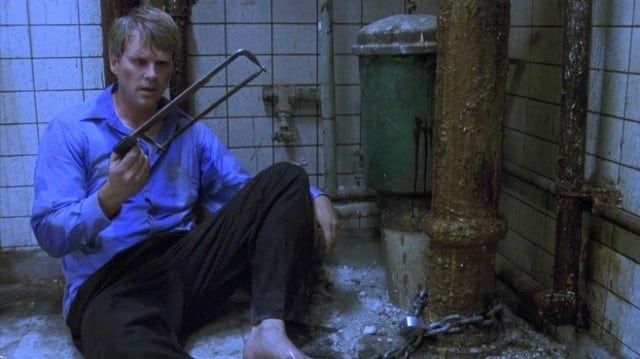
JH
It’s really an amazing thing. It’s one of those things that just doesn’t happen. It’s wild. I have so much love for the Saw franchise. Even though they’re not getting a Pulitzer, they’re just fun. I think that’s something people want, just something enjoyable and kind of crazy and out there.
FB
Over time as they tried to heighten the gore factor it was called torture porn. Which is legit, on some levels. But as the franchise evolved, they’ve found ways to develop more interesting storylines. The visceral thrill of that first one was extremely intense. Have you written any horror?
JH
I’ve written one horror sample. It’s okay. It’s not the greatest thing in the world. I do love horror, just as a genre. As a comedy writer, people always say horror and comedy are two sides of the same coin. I think there is always a pull for me to write horror and I have some more ideas that I’m going to play around with soon. Horror doesn’t get as much awards love, except recently, thanks to Jordan Peele and Ari Aster. It’s starting to get taken more seriously. People are starting to realize horror isn’t just for teenagers. It can tackle really serious topics in an approachable way. It’s the same with comedy. If it’s done correctly, it makes serious topics approachable. It also makes it feel like you’re not being hit over the head with a message.
FB
You’re right. Jordan Peele really elevated the genre with his movies. They’re really enjoyable and scary, but they have something to say, which is great for any genre. That distinguishes it. Then you have a broader audience where people are like, “Hey, there’s something else going on here.”
JH
Exactly. I think have to trick people into listening if you really want to say something. We’re inundated with information. We’re inundated with people posting on social media about something happening somewhere and how you should care about this thing. It’s almost like a care fatigue after a certain point. Everyone’s always telling me to be upset about something. If you really want someone to listen, you have to kind of trick them. If you’re posting it on social media, the only people who are going to listen are the people who follow you. They’re following you, most likely, because they agree with you or they’re friends with you. You’re not really saying anything, anyway. It’s just shouting into an echo chamber.
FB
Which is why storytelling is so powerful. You want people to be entertained and captivated but at the same time, it’s your chance to say what you want to say. If you do it subtextually they’re going to feel it. It’s going to be communicated because you’ve felt it and thought it when you put the words on the page. Then if you make the film or the TV show in a way that lets that subtext come out, people are going to get what it is you’re trying to share so badly.
This is a podcast about Alice in Wonderland so I’m curious, before you started working for the Frank Beddor Wonderland Factory, what was your experience with Alice in Wonderland growing up or in pop culture?
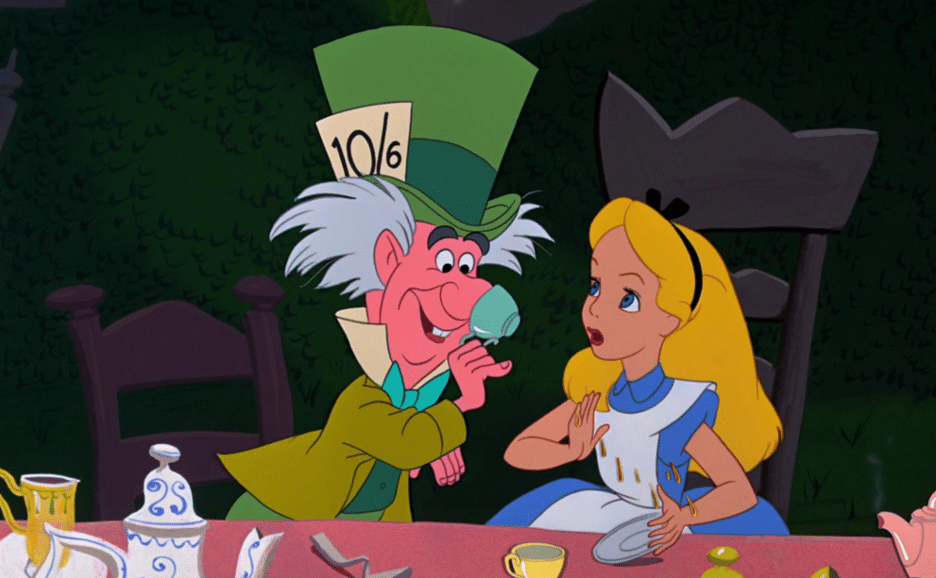
JH
I mentioned my dad worked at Disney when I was a kid. So I had all the Disney VHS tapes. My initial introduction to it was the Disney animated movie. I’ve mentioned it in some of the blogs that I’ve written, Alice in Wonderland is not pop culture, it is pop culture. It’s become a part of our language. Before I started working with you, I didn’t actually notice it as much. I would notice it if there was a specific reference or something like that. But through working with you, I’ve seen how it’s just everywhere. It’s to the point where people don’t even realize that it is an Alice in Wonderland reference. It’s been really intriguing and eye-opening to me. I feel like I took the red pill.
FB
One of the first blogs you did for me was Alice in Wonderland in politics. I don’t know how many cartoons I’ve seen with Donald Trump as the Red Queen saying, “Off with your head!” They use “down the rabbit hole” in these political cartoons. They often talk about the Mad Tea Party. They’ll put a lot of political people around the Mad Tea Party and start cracking jokes about the absurdity of what they’re doing. So to your point, it’s the perfect reference in that context. But then you might go over to music and you’ll get a Taylor Swift song that’s talking about a breakup and there will be lyrics about stepping through the looking glass and going down the rabbit hole of love. It really is everywhere. I love that blog you did and I know that that was one of the early initiations into, “Oh my god look at all this Alice stuff.”
JH
I remember when I turned that in to you, my first thought was “Okay, I just got this job and now I’m gonna get fired.”
FB
What was it about the blog that made you think that?
JH
In the introduction, I made jokes about how you were keeping me in a cage and forced me to write these blogs. Or how you were beating the blogs out of me.
FB
Because we had just started and you were making fun of me.
JH
I thought, “He’s either gonna get it or he’s not gonna want to work with me anymore.” But I figured, “Well, this is my style of comedy.” I do love writing these blogs. They’re a lot of fun to write. They’re always interesting to come up with and I always can go on some weird rant.
FB
Sarah sent me links to all of your blogs so I could reread them. We haven’t been working together that long but it’s such a big body of work already. I think it’s 16 or 17.
JH
I have a file just called “Frank” on my computer and it has folders inside of it to break up all the different things that I’ve done for you.
FB
You’ve done a series of blogs comparing IPs, the clash of the IPs. You’ve written about Alice in Wonderland versus Star Wars. Alice in Wonderland versus Lord of the Rings. Alice in Wonderland versus Harry Potter. You’re very funny in those because you’re writing it so you’re the judge, jury, and executioner. You’re like, “Oh, I think Alice wins this one.”
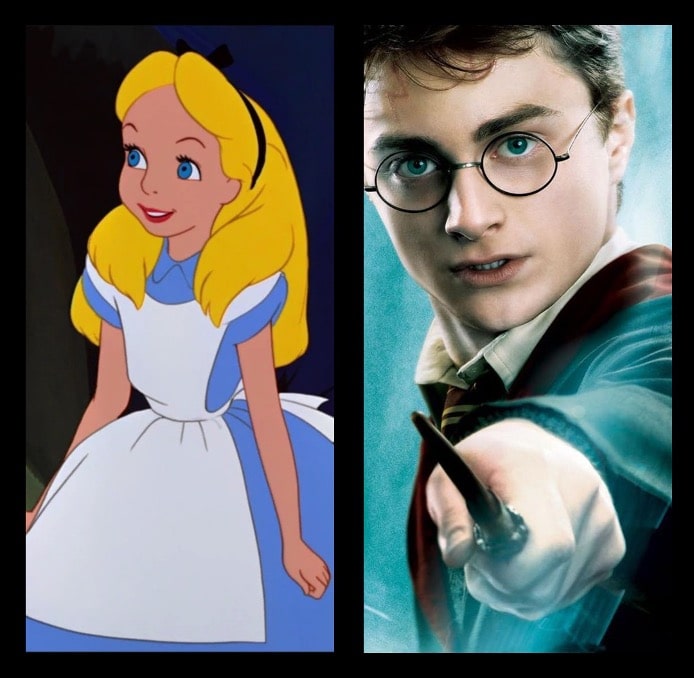
JH
I think I mentioned in almost every single one of them, “This is an Alice in Wonderland-themed website. Who do you think is gonna win?”
FB
Tongue in cheek for sure. It’s interesting because you think about the impact of Star Wars, which is so deep with publishing, theme parks, video games, TV, and of course, films. But then you look at Alice in Wonderland and you talk about how it’s been around 150 years, how it’s one of the most quoted literary works, the phrases that are used every single day. It’s a fun way of letting people compare and contrast Alice to other properties and enlighten them as to how much their favorite stories last and are in our pop culture. It’s the lasting impact that is so remarkable about these particular stories. What do you think it is about these stories, as a writer and somebody who wants their stories to live on? What do you think it is about some of these genres and stories that allow them to last for so many years?
JH
I think specifically with Alice in Wonderland, it’s political satire.
FB
On one level, for sure.
JH
But it’s also political satire that’s a children’s story, as well.
FB
It’s also a fantasy.
JH
It’s also fantasy. It’s imaginative. It’s the perfect storm. It has just a little bit of everything to keep any kind of reader interested. As I was saying that, I was thinking of Hayao Miyazaki’s movies like My Neighbor Totoro and Spirited Away. Those movies’ audience ranges from kids to grownups. It’s because it has a little bit of everything. They’re a little scary. They’re a little funny. It’s enough to keep everyone entertained. That’s the most important thing at the end of the day, that we create entertainment. If you manage to capture someone’s imagination and take them on a journey successfully, it’ll endure the test of time.
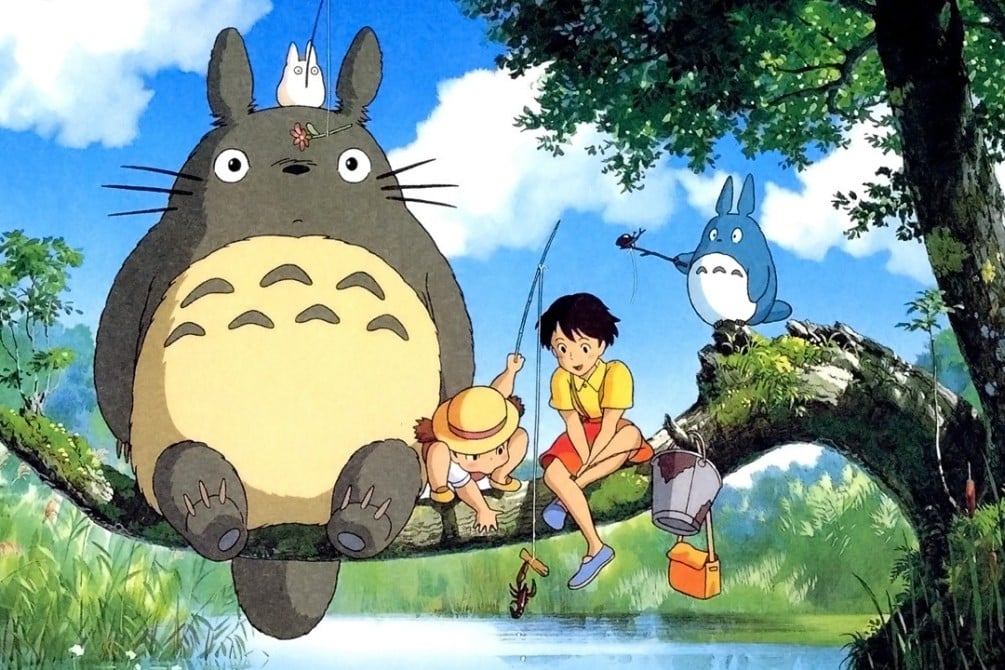
When I did Alice versus The Lord of the Rings, it was interesting because the Tolkien estate owns the word “Ent.” Just think about the words that were created. It’s the inventiveness of it. What was Tolkien on? It’s the same thing with Lewis Carroll pushing the limits of the human imagination. Putting something that inventive onto paper draws people in no matter what. Same thing with Star Wars or Dune.
FB
It seems to me that these stories communicate and tell a story that feels fresh, but are grounded in something familiar. Star Wars did that. The Lord of the Rings really did a deep dive and made you feel like you’re in an alternative world. Harry Potter in the same way. Alice in Wonderland, Carroll was writing it for himself. That’s the best kind of work. There are so many genres of publishing now, whether it’s picture books, young adult, or middle grade. It just goes on and on. It’s all in these categories and then it’s okay, “What do I want to write? Where does it fall?” Somebody else tells you where it falls but if you write from the heart and it’s something you care about, hopefully, it comes through.
JH
I think that goes back to what we were saying in the beginning. They were writing for themselves. The Lord of the Rings was actually a bedtime story Tolkien would tell to his kids. It comes from a place of not telling a story because you think that there’s going to be an audience for it. If it’s good enough, an audience will come. It doesn’t matter.
These are worlds that very creative people have managed to invent, and through that, other people were like, “How did you come up with this?” I think that’s why they’ve managed to endure, it’s just the inventiveness. With Star Wars, even though the story beats are ancient, it’s the world that drew people in.
FB
They’re classic though, the reluctant hero. That’s a classic trope. How you tell that story is the most important thing and Lucas told a reluctant hero story in a way that no one had ever seen before.
JH
Exactly. At AFI, they said there were only really six stories. Man versus man. Man versus the World. Man versus Nature. If you boil every story down, there are actually only six. It’s just how you tell all of those six.
FB
By the way, you’ve not only written blogs for me, but you’ve written some lore short stories set in The Looking Glass Wars universe. I knew you were a little bit nervous about writing prose when you first started because your mom told me you were nervous.
JH
I was nervous about writing prose. Because my writing style is not that of a proper essay writing style. Those who have read my stuff will completely understand. I like to write like I’m talking to you or you’re in on the joke with me. So when I was writing these lore stories in the universe that you’ve created from Alice in Wonderland, there’s a lot of whimsy but there’s also some seriousness to it. I wanted to treat your material with the respect it deserves and give you a good product. I was nervous, but in the end, I was really proud of what I came up with. When you called me and said those nice things when I’d sent it to you, I was like, “I have no idea.”
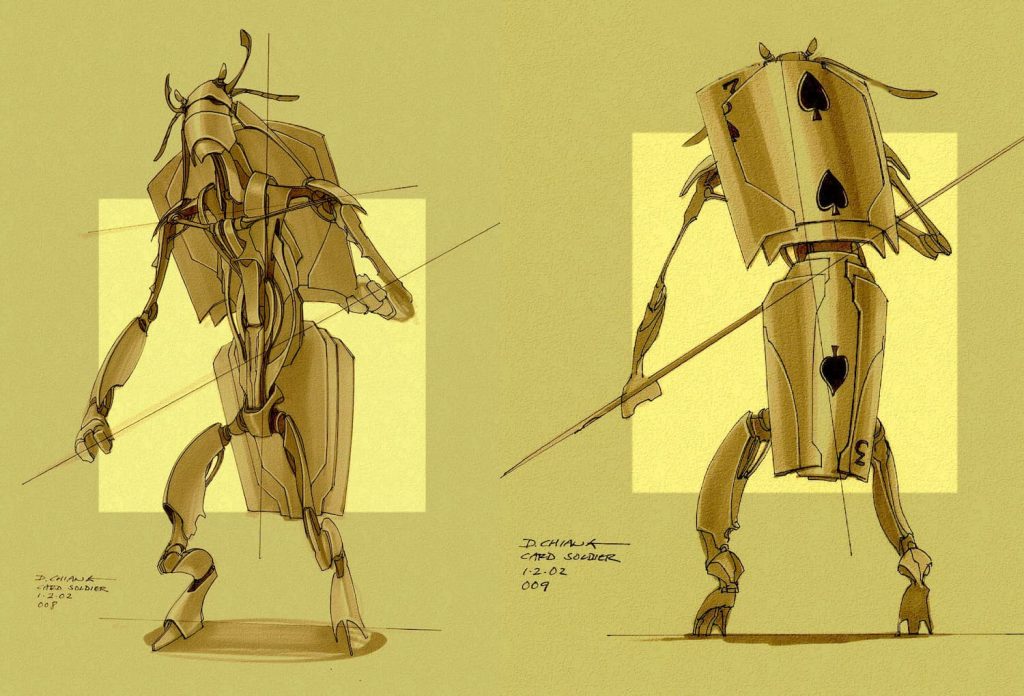
FB
I genuinely really, really loved it. The stories are meant to go along with a card game and you’re deeply seated in the tabletop and gaming world. You’ve also been very helpful and instrumental in helping shape that game along with Sarah my producer’s partner Marco, who’s taking the lead on creating this tabletop game. These all have this kind of collective energy, especially all of you writers from AFI that I’ve been introduced to and trying to shepherd, between the lot of you, some product that I can make some money off of.
But it’s really trying to shepherd that creative, collective team energy to create this game. It’s really enjoyable to have fresh ideas and creativity and have it all come together for a reason. So your lore stories are for a very good reason. That’s to broaden the world of The Looking Glass Wars and the Card Soldier premise. I’ve really enjoyed it and you’ve done a fantastic job. But before I let you go, I’m going to ask for your favorite Alice reference in pop culture, if you have one. It can be the Disney animated film, because your dad worked at Disney, which is a pretty cool job if you’re a kid, for sure.
JH
As a kid, but now as an adult, I’m like, “Oh my God, my poor father.”
FB
If you were a character from Alice’s Adventures in Wonderland, who would you be? And why?
JH
Well, probably the March Hare. I think he’s interesting. I remember as a kid I always thought, “Who’s this rabbit sitting next to the Mad Hatter, who’s just as crazy?”
FB
I don’t think you hear about the March Hare as much because that’s how crazy the Mad Hatter is.
JH
Exactly. And it’s not necessarily an Alice reference, but my favorite thing I’ve written a blog about was the 1999 Alice in Wonderland TV movie with Gene Wilder as the Mock Turtle. When I first got the job here, I wanted to pitch a joke article that was, “I took LSD and watched Alice in Wonderland so that you don’t have to.” But after watching that movie, I don’t need to even pretend to do that because that movie is just so jarringly weird. It’s so odd and interesting. The cast is insane.
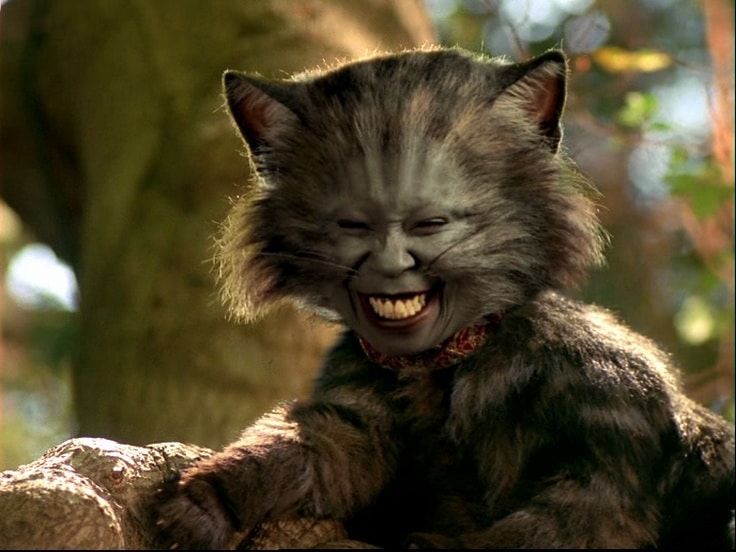
FB
Whoopi Goldberg is the Cheshire cat. In that blog, you were casting the remake version, which was funny. So people should check out some of your blogs on frankbeddor.com. Do you have any projects you’re excited about?
JH
It’s just a bunch of things that are in the works.
The treatment I was hired to do, I don’t know what I can say about it. Lots of comedies coming, which I’m very excited about. One is inspired by when I went to college for five minutes I joined a fraternity and I was just thinking about hazing. So it’s a comedy about hazing. The whole idea is there are those coed fraternities and they’re technically educational fraternities but are not educational. There’s an honors fraternity, which is coed. They’re not about throwing parties and all that stuff but the idea is that a kid who has just joined passes away and it looks like a hazing death. So they have to hide the body and it turns out all the fraternities on the campus have also killed. They’re like, “Oh, no, we kill a kid like every year.” The best example would be a comedic Pretty Little Liars set on a college campus. There are these idiot frat bros and then this honors society becomes cool because someone’s died.
FB
It’s a send-up of that culture. I’d like to read that. Sounds like a fun read. You could do a version of this that is not that far away from your dad’s movie.
JH
Hazing still exists even if they say it’s not legal. But to me, I’ve always just found it hilarious, to an extent. Obviously, the kids that are legitimately torturing people are messed up. But you could turn that into a thriller. There was the movie Goat, which starred Nick Jonas.
FB
Also maybe focus on the reason people connect in that environment and the longevity of those relationships.
JH
My old roommate went to a very big party school and he’s talked about the hazing he went through. I do think that there is some kind of bonding experience. “We made it through.” It’s that kind of hypermasculinity stupidity. I think, to an extent, guys like going back to caveman brain every now and then.
FB
My son is at the age and he’s looking for colleges and we’ve been talking about certain schools and I’ve said, “This school, you definitely have to be in a fraternity because the whole social structure is based on that.” He’s not into that but a lot of people do it and a lot of people have lifelong friends from it. I suppose you might be right about that.
JH
That being said, there were a lot of times when the guys I was in the fraternity with would say, “We’re brothers.” I would go, “No, you guys are my drinking buddies.” There are a couple of longtime friends that I did make but there were people I didn’t like here. It’s interesting to look at fraternities. The people who take it really seriously, it’s kind of weird. I was straight up when I joined. I was like, “I’m here because this is how I can get into parties.”
FB
Good luck with it, let me know when I can read it. In the meantime, you’re writing a blog for me so I’ll expect it shortly. already. I think writers who are entering the business write in the mediums that they’re offered. You’ve taken this opportunity to write these blogs and I’m really proud of the work that you’ve done. Seeing it collectively is impressive. I hope we continue but maybe we can transition into some television work and make both of us a little bit of cash eventually.
JH
That’d be fantastic. Thank you for not only having me here but for even taking a chance on me and hiring me. John and I and maybe five other writers from AFI are the only ones who are actually writing. It’s hard. So I appreciate you taking me on and giving me almost too much freedom with the blog.
FB
I’m realizing that now but yeah, live on the wild side. So thanks for coming on, man. It’s been a pleasure to hang out and to talk.
JH
This was great. Bye.
For the latest updates & news about All Things Alice, please read our blog and subscribe to our podcast! If you’d like to hear Gerard’s excellent narration of The Looking Glass Wars, click here!